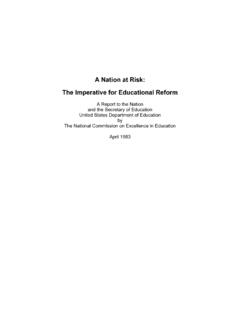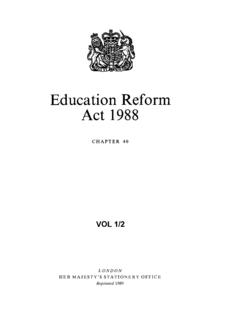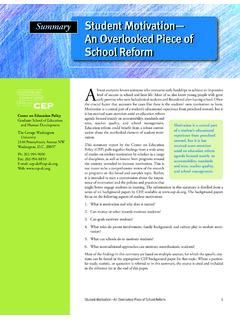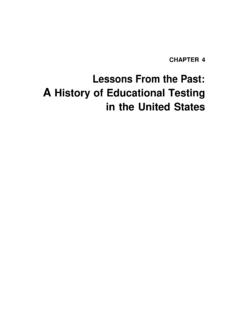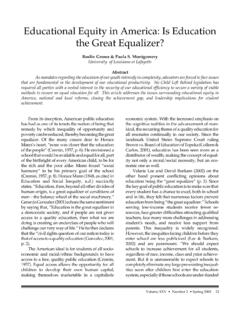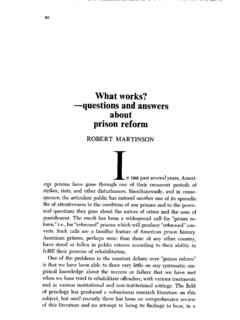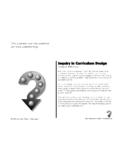Transcription of Parenting and Educational Achievement - THE LIZ LIBRARY
1 The Impact of ParentalInvolvement, Parental Supportand Family Education on PupilAchievements and Adjustment:A Literature ReviewProfessor Charles DesforgeswithAlberto AbouchaarResearch Report RR433 RESEARCH 1 Research Report No 433 THE IMPACT OF PARENTAL INVOLVEMENT, PARENTAL SUPPORT AND FAMILY EDUCATION ON PUPIL Achievement AND ADJUSTMENT: A LITERATURE REVIEW Professor Charles Desforges with Alberto Abouchaar The views expressed in this report are the authors' and do not necessarily reflect those of the Department for Education and Skills. Queen s Printer 2003 ISBN 1 84185 999 0 June 2003 2 Acknowledgements This report was compiled in a very short time thanks to the invaluable help given generously by a number of workers in the field.
2 Outstanding amongst these were Mike Gasper, John Bastiani, Jane Barlow, Sheila Wolfendale and Mary Crowley. I am most grateful for their collegial participation. Most important of all to a review are those who work in the engine room. The search, identification, collection and collation of material and the production aspects of the report are critical. Special thanks are due here to Anne Dinan in the University of Exeter LIBRARY , Finally, this work would not have been possible without the limitless support of Zo Longridge-Berry whom I cannot thank enough.
3 3 Contents Chapter 1 Introduction 1 Chapter 2 Researching parental involvement: some conceptual and methodological issues 6 Chapter 3 The impact of parental involvement on Achievement and adjustment 17 Chapter 4 How does parental involvement work? 24 Chapter 5 Ethnicity, parental involvement and pupil Achievement 31 Chapter 6 Differences between parents in levels of involvement 35 Chapter 7 Enhancing parental involvement in practice: focus on parent/school links 46 Chapter 8 Adult and community education and parent training programmes 65 Chapter 9 Conclusions 78 References 86 Appendix A The review process 98 Appendix B Effect sizes of parental involvement on school outcomes 100 4 Executive Summary i A review of English language literature was conducted to establish research findings on the relationship between parental involvement.
4 Parental support and family education on pupil Achievement and adjustment in schools ii Two distinct bodies of literature were discerned. One focussed on describing and understanding the nature, extent, determinants and impact of spontaneously occurring parental involvement on children s Educational outcomes. The second body of work is concerned with describing and evaluating attempts to intervene to enhance spontaneous levels of involvement. iii Recent research on spontaneous levels of parental involvement is generally of a very high quality using advanced statistical techniques to describe the scope and scale of involvement and to discern its unique impact on pupil Achievement .
5 Iv This research consistently shows that Parental involvement takes many forms including good Parenting in the home, including the provision of a secure and stable environment, intellectual stimulation, parent-child discussion, good models of constructive social and Educational values and high aspirations relating to personal fulfilment and good citizenship; contact with schools to share information; participation in school events; participation in the work of the school; and participation in school governance. The extent and form of parental involvement is strongly influenced by family social class, maternal level of education, material deprivation, maternal psycho-social health and single parent status and, to a lesser degree, by family ethnicity.
6 The extent of parental involvement diminishes as the child gets older and is strongly influenced at all ages by the child characteristically taking a very active mediating role. Parental involvement is strongly positively influenced by the child s level of attainment: the higher the level of attainment, the more parents get involved. The most important finding from the point of view of this review is that parental involvement in the form of at-home good Parenting has a significant positive effect on children s Achievement and adjustment even after all other factors shaping attainment have been taken out of the equation.
7 In the primary age range the impact caused by different 5 levels of parental involvement is much bigger than differences associated with variations in the quality of schools. The scale of the impact is evident across all social classes and all ethnic groups. Other forms of parental involvement do not appear to contribute to the scale of the impact of at-home Parenting . Differences between parents in their level of involvement are associated with social class, poverty, health, and also with parental perception of their role and their levels of confidence in fulfilling it.
8 Some parents are put off by feeling put down by schools and teachers. Research affords a clear model of how parental involvement works. This model is described in the report. In essence Parenting has its influence indirectly through shaping the child s self concept as a learner and through setting high aspirations. v Research on interventions to promote parental involvement reveals a large number of approaches ranging from parent training programmes, through initiatives to enhance home school links and on to programmes of family and community education.
9 Vi Evaluations of this very extensive activity reveal There is a perceived increased need and an evident increase in demand for such support High levels of creativity and commitment are evident amongst providers and high levels of appreciation are recorded by clients. vii Unfortunately the evaluations of interventions are so technically weak that it is impossible on the basis of publicly available evidence to describe the scale of the impact on pupils Achievement . This is not to say the activity does not work. viii The research base from intervention studies is too weak to answer some of the review questions.
10 It is not possible to rate the relative effectiveness of work in different key stages or to import lessons from abroad where the evidence base suffers from the same faults. ix The review concludes by arguing that We have a good enough knowledge base to understand how spontaneous parental involvement works in promoting Achievement . Current interventions, whilst promising, have yet to deliver convincingly the Achievement bonus that might be expected. 6 The Achievement of working class pupils could be significantly enhanced if we systematically apply all that is known about parental involvement.


